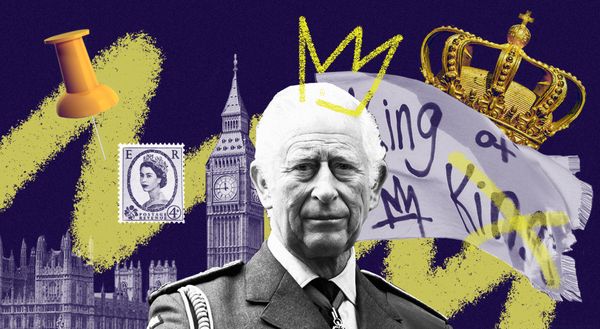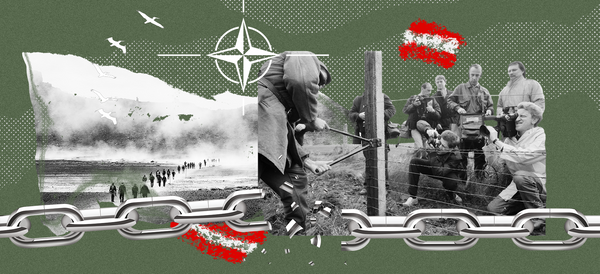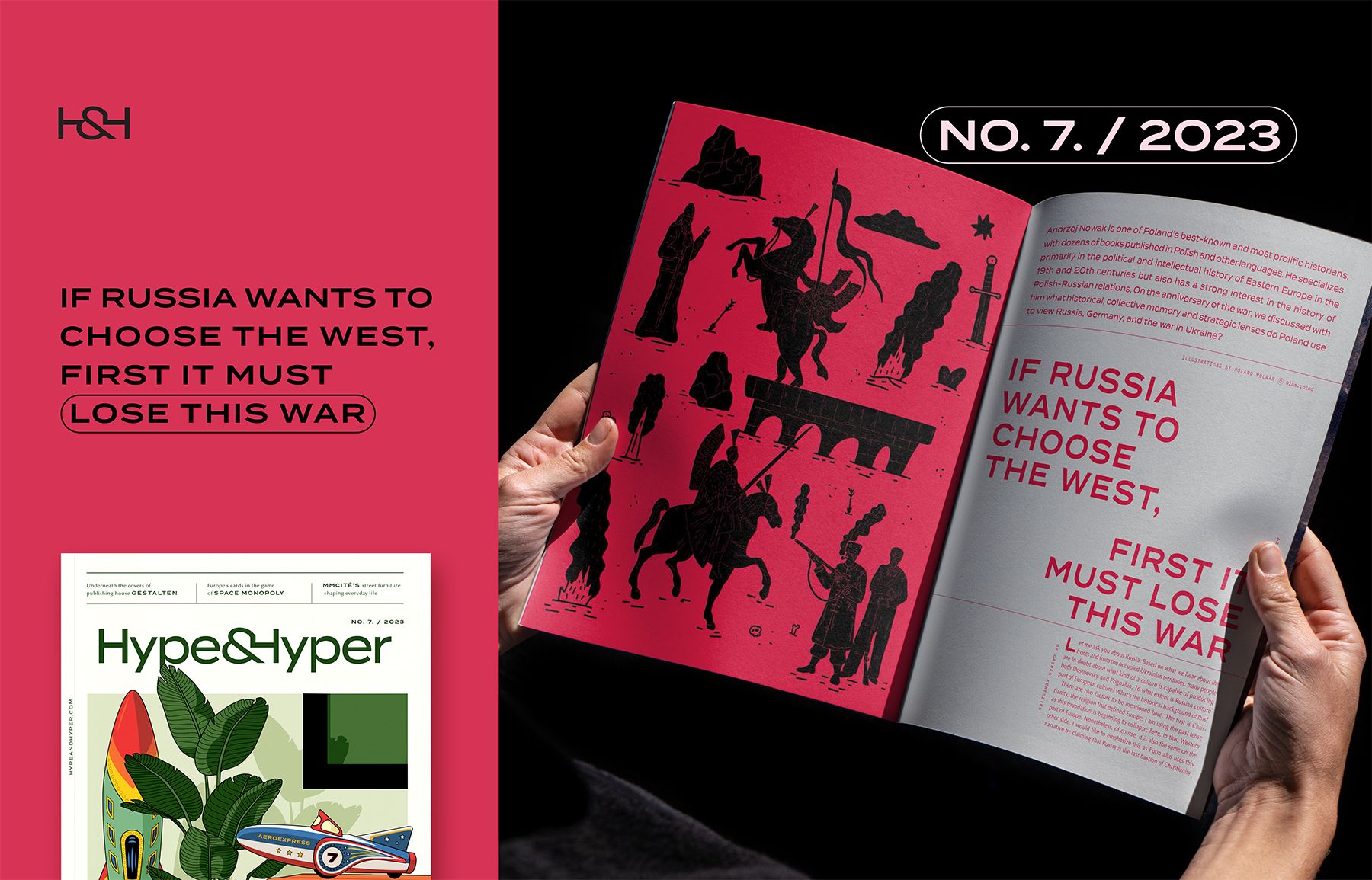Andrzej Nowak is one of Poland’s best-known and most prolific historians, with dozens of books published in Polish and other languages. He specializes primarily in the political and intellectual history of Eastern Europe in the 19th and 20th centuries but also has a strong interest in the history of Polish-Russian relations. On the anniversary of the war, we discussed with him what historical, collective memory and strategic lenses do Poland use to view Russia, Germany, and the war in Ukraine?
Written by Gáspár Keresztes
Let me ask you about Russia. Based on what we hear about the fronts and from the occupied Ukrainian territories, many people are in doubt about what kind of a culture is capable of producing both Dostoevsky and Prigozhin. To what extent is Russian culture part of European culture? What’s the historical background of this?
There are two factors to be mentioned here. The first is Christianity, the religion that defined Europe. I am using the past tense as this foundation is beginning to collapse; here, in this, Western part of Europe. Nonetheless, of course, it is also the same on the other side; I would like to emphasize this as Putin also uses this narrative by claiming that Russia is the last bastion of Christianity. Which is an extremely cynical lie; I could talk about it for hours. Secondly, Russia was under Mongol occupation for 240 years. During that time, the Russians were under a different kind of rule; they experienced another civilization which had a huge effect on them. The term „samoderzhaviye,” i.e., autocracy, is most commonly used to describe this. And this political culture was blessed by the Orthodox Church. The essence of such political culture is that there is no legal relationship between the rulers and their subjects; in practice, the subjects had to obey the ruler’s orders unconditionally. There is no sort of social contract; the subjects owe absolute obedience to the ruler and are totally dependent.

How can this tradition be reconciled with the European civic tradition?
The official Russian state ideology started to become fundamentally anti-European from the 15th century onwards. This became the ideology of Moscow, the „Third Rome,” proclaiming that Russia is the new imperial center that must replace and destroy its Western competitor because the West is bad; the Latin West is evil, even worse than Islam. The Orthodox Church puts this mindset in the people’s heads in Russia. But, of course, later, they realized that Russia was not capable of winning against its Western neighbors by relying on its own somewhat outdated state apparatus. Therefore, Russia needed to import more modern, Western techniques; this had already begun in the 17th century but peaked under Peter the Great. This is how Russia arrived in Europe, but as late as the beginning of the 18th century. It began to raise, even to invest into this hope, by persuading French philosophers and intellectuals who proclaimed that Russia was going to be the most European nation east of Germany. Other countries did not matter as they are small; what mattered was that Russia would be modern. This attitude began to emerge in the 18th century, starting with Voltaire and Diderot.
By the way, I have just come back from a conference in Germany, where our German hosts were still talking about Germany’s intention to build a bridge between Berlin and Moscow. And they were shocked that the Ukrainians and Lithuanians there protested against the idea quite vehemently. The surprised Germans asked in all sincerity what was wrong with their plan. Finally, I replied: perhaps you should first ask those who live under the bridge. Because some people in Germany and France seriously imagine building this wonderful bridge from Berlin or Paris to Moscow without giving a damn what is under the bridge. They do not care at all about the Poles, Hungarians, and Ukrainians living between the great powers. So, unfortunately, such a bridge is a bridge of Russian imperialism, not of peace.
But now it seems Poland stood up in the middle of this bridge and started to collect tolls, or at least it built a stable pillar for itself. Warsaw is leading the anti-Russian coalition, and it has become increasingly critical of Germany’s approaches. For instance, most recently, the Polish press reported that the German decision to hand over the Leopards was the result of pressure from Poland. So where do you think the notoriously complicated German-Polish relations are going?
From the German perspective, I see two options for the future of the German-Polish relationship’s future: one quite good and one very bad. Starting with the good one, perhaps the Germans will eventually realize that they should not aim to control their eastern neighbors. The current German thinking is only mild imperialism, of course, in no way comparable to what was in Hitler’s time. This is the idea of Mitteleuropa, from 1915, or actually dating back even earlier, from the idea of Friedrich List from the mid-19th century, who imagined Central and Eastern Europe as a kind of „natural hinterland” of Germany, with only formally independent states, that are economically and culturally totally dependent on Germany.
Now, if we manage to maintain the current state of affairs in Poland for at least a few years with Ukraine, Lithuania, and hopefully Belarus, if the once excellent Hungarian-Polish relations are repaired, and if the Czechs and the Baltic states join, then perhaps we can succeed in curbing the structural neo-imperialization of the European Union. Because two countries are definitely in favor of this neo-imperialism: Germany and France. Both would love to control the whole of Europe individually. But if one of them feels weaker, they start to talk about the so-called Berlin-Paris axis. Macron and Scholz would like to lead the continent, but Italy’s Meloni, for example, has already indicated that they do not like this idea. Not long ago Barack Obama basically suggested that Europe no longer matters and that Washington can leave all European affairs to Merkel. The Americans completely changed their way of thinking; it is clear from the strong bipartisan support for a tough stand against Putin. Therefore, if Americans do not step back from this for a few years, and they will not, our countries will increasingly be seen as equal members of the European community. And that would be the main point! The second and worse scenario: the Germans insist on building the bridge to Russia. They are still unable to forget that they have lost two world wars. And they did not lose them because of Russia, they don’t have complaints about Moscow in this regard; they lost the wars because of the US. The subliminal hatred of the Americans is shockingly strong in both France and Germany. If we scratch the French or Germans a bit, the anti-American attitude immediately comes out. I am not talking about the whole population, but the French and German economic and political elite are like that. And I think this sentiment makes them tempted to collude with the Russians and stand together against America. For Poland, this is the darkest scenario because, in the worst and most extreme case, it would lead to the partition of Poland again. Of course, the Russians are constantly giving hints of advocating this scenario. Most recently Kadyrov, who recently suggested that Silesia should return to Germany. So, we should not forget the partition plan, even if it does not seem very realistic at the moment.

But then, what would be a good or fair scenario for Russia? Falling back to a second Yeltsin era? That would only set the stage for the next „strong man...”
What would be an advantageous victory from a Polish standpoint? The secret of Putin’s success so far has been that the consecutive offensives he has launched have been successful. Why would the Russians not support him if he is triumphant every time? If he always got what he wanted with his aggressive imperialism... Now, returning to the pre-2014 borders would obviously be a disaster for Putin. In this case, he could not tell his audience at home that Russia, with his leadership, won again. And it would also mean that 150,000 Russian soldiers sacrificed their lives for nothing. In Russia, as long as they win, it is not a problem if even a quarter of a million soldiers die; they would still say, „Pobeda za nami!” meaning „the victory is ours.” But it may start to change the Russian mentality if their army is defeated. Of course, this is only my hope, you may be right, and it may not be enough. Still, I think in this case, Germany’s experience could serve as a good example: Some people say that after 1991 Russia did not take the opportunity to become a normalized country. The difference is evident compared to Germany. After the Second World War, Germany was under occupation for a long period, but it was still a prosperous time for Germans. And this is an ideal trade-off: occupation and prosperity. We can have a critical opinion of Germany, but this period allowed the country to throw off the attitude of aggressive, militant imperialism. The question is whether we can imagine a similar type of occupation in Russia: but I am afraid we cannot. Many say that everything will be fine with Russia once Putin disappears. But, for instance, Navalny has the exact same imperialist views as Putin.
So, there is no real chance of radical change in Russia?
Well, we should not forget that time passes in the meantime, and the changes will benefit neither Europe nor Russia. The 1990s will not come back, as, for instance, now there are eleven times more Chinese than Russian people. Another shocking figure: when the Soviet Union invaded Afghanistan, about 14 million people lived there. Today Afghanistan’s population is 45 million. So, the ratio of Russians to Afghans was twenty to one during the invasion, while now it is only three to one. The significance of these figures should not be underestimated. Russia will be pushed ever harder toward the West by Asia; this is inevitable. Russia may become the vassal, the western margrave of a Chinese empire hostile to the West. Moscow may have to settle for such a minor position. But, on the other hand, Russia may prefer to be the eastern margrave of the Western empire that is fighting with its last forces for existence in the 21st century. So, this is the choice I see Russia will be facing in the future. But if it wants to choose the West, first it must lose this war...
Illustrations: Roland Molnár
Continue reading in H&H issue no.7!
ORDER HERE
Monarchy: outdated form of government or democratic triumph?

Are we willing to pay for security and freedom?










